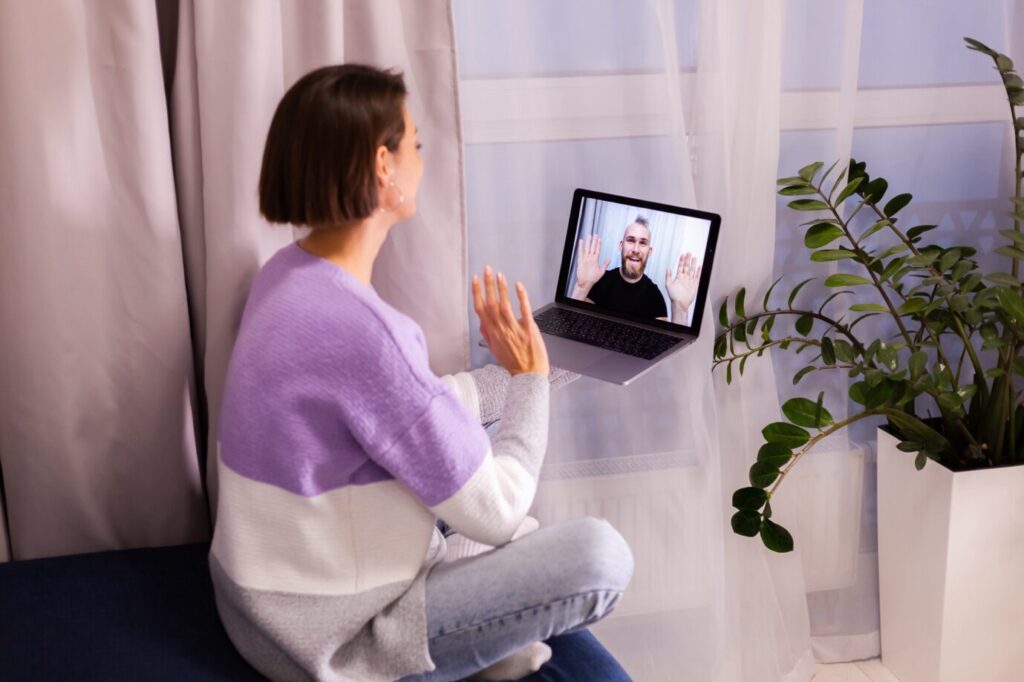In today’s fast-moving, overstimulated world, anxiety and depression have become common, yet deeply personal, experiences. They affect how we think, feel, relate to others, and manage the responsibilities of daily life.
For some, these conditions are intermittent, flaring up during times of transition or stress. For others, they feel like constant companions that cloud everything. No matter the intensity or duration, what often stands in the way of getting support isn’t unwillingness; it’s the challenge of logistics, time, and comfort. This is where online therapy emerges as a highly effective primary solution.
As licensed therapists specializing in adult mental health, we’ve seen firsthand how online therapy has revolutionized access to care for clients across California. No commute. No awkward waiting rooms. No rigid scheduling conflicts. Just focused, professional support delivered in a format that works with your life instead of against it.
But how does online therapy help, specifically, with anxiety and depression? And what makes it not just convenient but clinically powerful?
Let’s explore that in depth.
Understanding Anxiety and Depression in the Adult Experience
Before we dive into treatment, it’s important to recognize that anxiety and depression don’t always look the way media portrays them. They’re not always panic attacks or visible sadness. In reality, they often show up as:
- Constant overthinking or “what if” spirals
- Emotional flatness or numbness
- Restlessness or chronic fatigue
- Avoidance of social or professional obligations
- Loss of motivation or interest in once-enjoyed activities
- Trouble concentrating or sleeping
- Irritability, guilt, or a sense of being “off” for no clear reason
Both conditions frequently co-occur. In fact, many people experience them as a tangled loop: anxiety creating stress that leads to low mood, and depression fueling thoughts that increase anxiety.
It’s also worth noting that not everyone who struggles reaches the point of crisis. High-functioning individuals (those who appear successful or “put together”) are often battling severe symptoms beneath the surface. Their suffering is no less real.
That’s why early intervention, consistency, and access to the right support are key.
Recommended Read: Anxiety and Perfectionism: Breaking Free from the Need to Be Perfect
What Is Online Therapy and How Does It Work?

Online therapy (also called teletherapy or virtual therapy) is exactly what it sounds like: professional counseling conducted via secure video platforms. You connect with a licensed therapist through a scheduled virtual session, typically from your own device at home.
At MindShift Psychological Services, we offer online therapy exclusively to adults across California. Our sessions are conducted over a HIPAA-compliant platform to ensure your privacy and comfort.
Each therapist is fully licensed and trained in evidence-based practices such as:
- Cognitive behavioral therapy (CBT)
- Eye movement desensitization and reprocessing (EMDR)
- Psychodynamic therapy
- Attachment-based therapy
- Somatic and mindfulness-informed techniques
You receive the same level of care you’d expect in an office without the friction that often makes therapy hard to start or maintain.
Online Therapy for Anxiety: Practical, Personalized, and Proven
Anxiety isn’t just worry. It’s a pattern of hyperarousal, fear, and avoidance that affects your body, mind, and behavior. Whether you experience social anxiety, generalized anxiety, health anxiety, or panic attacks, therapy is one of the most effective ways to disrupt that cycle.
Here’s how online therapy helps manage anxiety:
1. Real-Time Identification of Triggers
With virtual sessions taking place in your real-world environment, your therapist gains more context into the triggers that affect you day to day. You can discuss a moment that happened just minutes earlier, in your actual space, without needing to recount it from memory in an unfamiliar office.
Therapists can help you become more aware of subtle cues (such as tension before a meeting or spiraling thoughts while checking email) that might otherwise be overlooked. This real-time insight allows for more immediate, targeted interventions.
2. Structured Exposure and Desensitization
For clients working on fears, avoidance behaviors, or social anxieties, therapists may guide you through exposure-based exercises while you remain in your natural environment. You might be encouraged to stay present during discomfort or resist compulsive behaviors with the support of your therapist right there, virtually. These exposures can be customized to your home life, work setup, or daily stressors, making the therapy more relevant and sustainable.
Over time, repeated exposure reduces the physiological intensity of fear and builds tolerance.
3. Tools You Can Use Immediately
Because you’re already home, you can apply techniques in real time. If your therapist teaches a grounding exercise or thought-restructuring method, you can practice it on the spot (in your room, at your desk, in your car) and see how it works in your actual life.
You can also experiment between sessions, then reflect on what helped or what didn’t during your next virtual meeting. This cycle of practice and reflection accelerates progress by reinforcing change in the exact context where anxiety usually lives.
4. Control, Comfort, and Continuity
Anxiety often thrives in unpredictability. Online therapy offers a level of control that can calm the nervous system before a session even starts. You’re in your space, with your comforts, and your schedule. That safety can enhance your ability to open up and engage in the work. You can also maintain continuity if you travel, move, or face life disruptions, ensuring that your mental health support stays consistent even when everything else feels uncertain. That consistency can make all the difference in managing chronic anxiety.
Online Therapy for Depression: Building Connection and Motivation from a Distance
Depression drains energy, motivation, and hope. It can make everyday tasks feel impossible, and the idea of driving to an office or interacting with others might feel like too much. That’s one of the reasons online therapy is so powerful for managing depression: it removes the initial barriers that often prevent people from getting help in the first place.
1. Therapy Without Leaving the House

On days when getting out of bed feels like a feat, you can still attend therapy. That level of access is critical for depression recovery, where consistency and momentum matter. Just being able to show up, virtually, can be a huge step forward.
2. Addressing Isolation with Safe Connection
Depression often comes with withdrawal and disconnection. Online therapy gives clients the chance to connect with a supportive, present therapist without feeling overstimulated or exposed. It creates a safe entry point to rebuild trust in relationships, one session at a time.
3. Reframing Negative Thought Cycles
Using CBT and related tools, therapists help clients identify and challenge unhelpful core beliefs, like “I’m a burden,” “Nothing will get better,” or “I’m not good enough.” In the privacy of your space, those conversations can feel more contained and less overwhelming.
4. Helping Clients Re-engage with Life
Therapists work with clients to set realistic goals and gently reintroduce joy, structure, and agency into daily life. Whether it’s a morning routine, a 10-minute walk, or a journaling habit, small shifts add up. Online sessions help keep you accountable without pressure.
Customizing Therapy to Fit Your Needs
No two people experience anxiety or depression the same way. For therapy to work, it must feel tailored, not formulaic. One of the strengths of online therapy is that it allows for truly personalized care in an environment that already reflects who you are and how you live.
At MindShift Psychological Services, each therapist takes time to understand your goals, daily routines, emotional cycles, and even your physical environment.
This allows us to:
- Adjust session timing and frequency to meet your energy levels
- Recommend coping strategies that align with your lifestyle and strengths
- Adapt therapeutic language based on how youprocess information (visually, somatically, conceptually, or verbally)
- Check in between sessions when needed, so therapy feels like a continuous support, not a once-a-week reset
Personalization is especially important for high-functioning adults, who often manage their symptoms so well externally that their inner struggles go unnoticed. With online therapy, you don’t have to downplay what you’re feeling to “keep up appearances.” You get space to be fully honest, supported, and heard.
Recommended Read: Understanding Trauma: Types, Symptoms, and Paths to Healing
Who Can Benefit from Online Therapy?
You don’t have to be in crisis to benefit from therapy. Online therapy can be a valuable tool for anyone who:
- Experiences daily or occasional anxiety
- Feels emotionally flat, stuck, or unmotivated
- Has trouble sleeping, focusing, or relaxing
- Finds it difficult to enjoy life, even when things are “going well”
- Avoids situations, people, or tasks due to fear or low energy
- Spends a lot of time in self-criticism or rumination
- Struggles with perfectionism, people-pleasing, or emotional detachment
- Wants to understand themselves better and grow emotionally
Therapy can also be preventive. Addressing stress, burnout, or relationship challenges early often stops them from escalating into full-blown mental health conditions.
Does Online Therapy Actually Work?

Multiple studies have shown that online therapy is just as effective as in-person care for a wide range of emotional and psychological conditions, including anxiety and depression.
Some additional research-backed benefits of online therapy include:
- Higher attendance and consistency rates due to convenience
- Increased openness and emotional safety for individuals who feel overwhelmed in clinical settings
- Stronger outcomes for people with mobility or transportation limitations
- Better long-term results for clients who stick with therapy due to reduced friction
In short: online therapy works not just because it’s easy to access, but because it helps people engage more consistently and authentically with their healing process.
Frequently Asked Questions (FAQs)
- Is online therapy really confidential?
Yes. At MindShift Psychological Services, all sessions are conducted through a HIPAA-compliant platform with secure end-to-end encryption. Your privacy is fully protected.
- Will I still connect with my therapist like I would in person?
Absolutely. The therapeutic relationship is built through trust, empathy, and consistency, not physical presence. Many clients find it even easier to connect with their therapist when sessions take place in a familiar, comfortable environment.
- What do I need to start online therapy?
Just a device with a camera (smartphone, tablet, or computer), a stable internet connection, and a private space where you feel comfortable. No apps or complicated software required.
- Can I switch therapists if I don’t feel it’s a good match?
Yes. Therapeutic fit is essential, and we encourage open communication. Our team is always happy to help you find a therapist whose style, approach, and personality feel right for you.
Choosing the Right Therapist for Anxiety and Depression
Finding the right therapist is one of the most important decisions in your healing process. At MindShift Psychological Services, our therapists are not only licensed and experienced; they specialize in adult therapy and understand the unique ways anxiety and depression manifest in different lives.
Some things to consider when choosing a therapist:
- What therapeutic methods do they use? (We offer CBT, EMDR, psychodynamic therapy, and more.)
- Do they have experience treating anxiety and/or depression specifically?
- Are they skilled at working with high-functioning individuals or those with subtle symptoms?
- Do they offer flexibility in scheduling and pacing?
- Do you feel safe, respected, and listened to during your first session?
We encourage every new client to view the first session as a mutual introduction. It’s not just about telling your story; it’s about deciding whether the therapist you’re speaking with feels like someone who can walk alongside you in this process.
Healing From Home
Online therapy isn’t just a modern convenience; it’s a lifeline. For many adults struggling with anxiety and depression, the biggest barrier to healing is not the willingness to change, but the ability to access consistent support. Telehealth therapy removes that barrier.
At MindShift Psychological Services, we specialize in therapy for anxiety and depression, marriage counseling, online cognitive behavioral therapy, family counseling, and more. We believe care should be both excellent and accessible. Whether you’re working through panic attacks, emotional numbness, perfectionism, or simply feeling “not like yourself,” we’re here to help you make sense of it, work through it, and move forward.
You don’t need to suffer in silence. You don’t need to wait for things to get worse. And you don’t need to do it alone. We’ll meet you right where you are.
Contact us today to book your first online session. Let’s talk about how we can help you feel more like you again.



